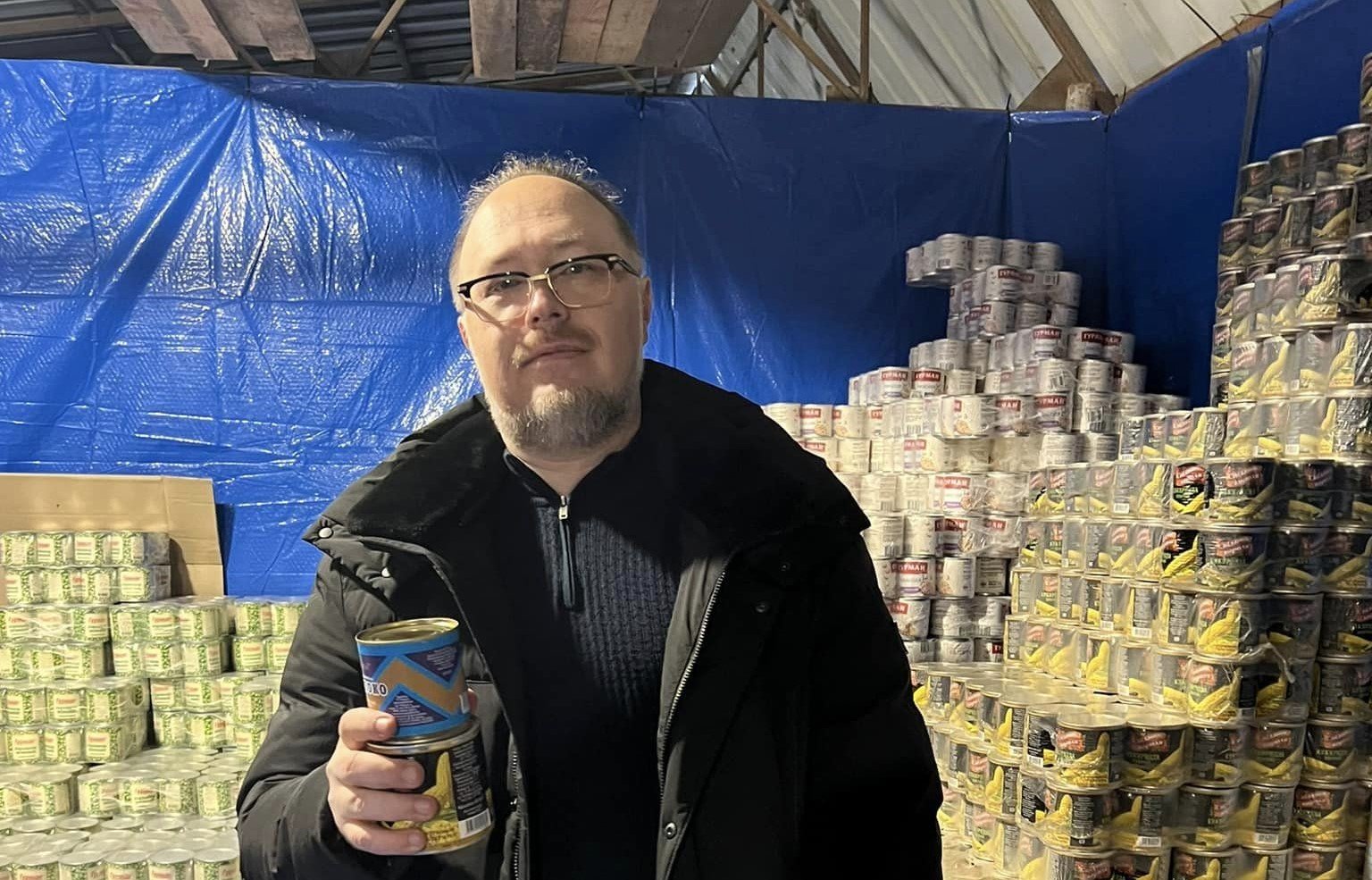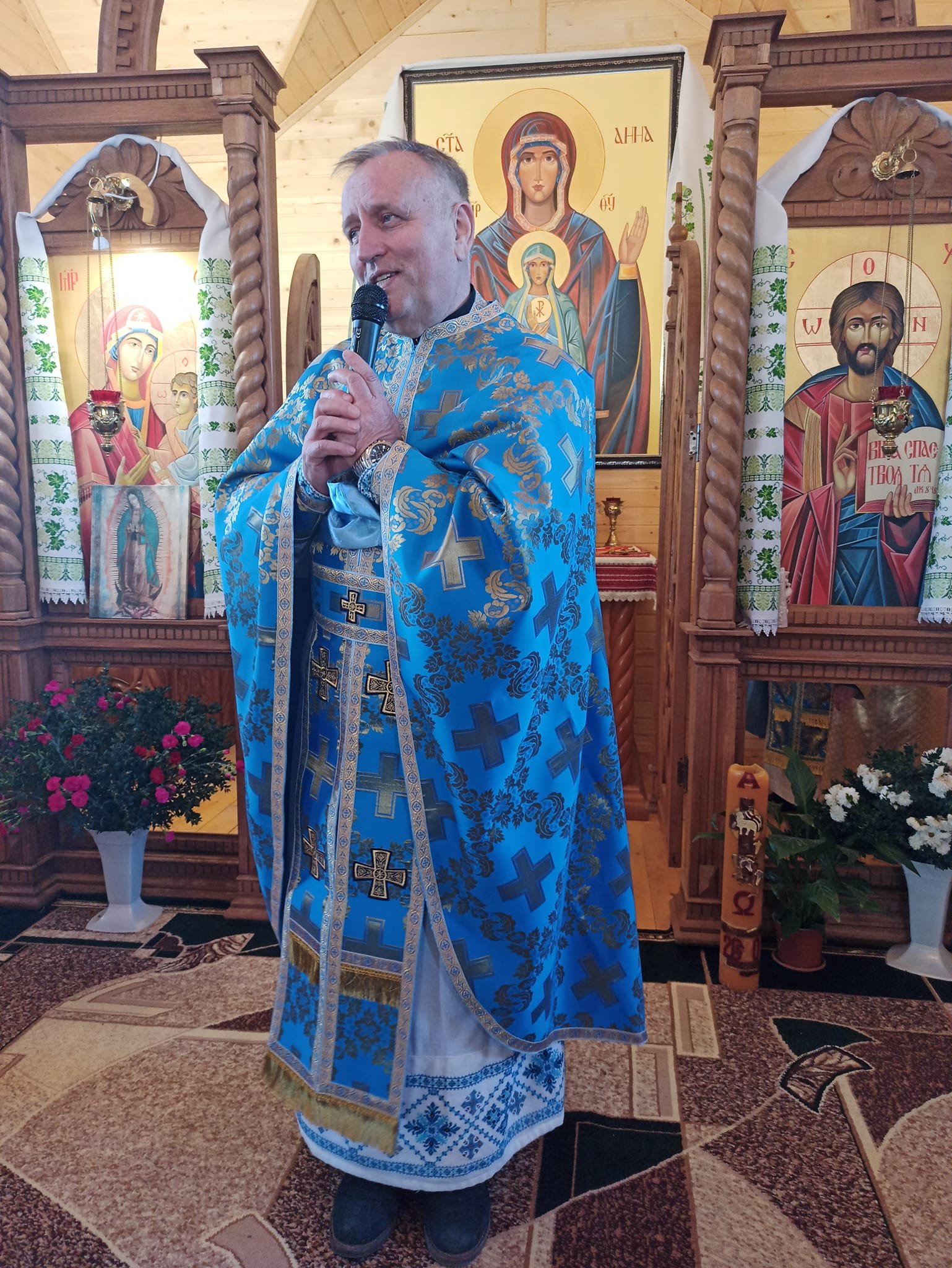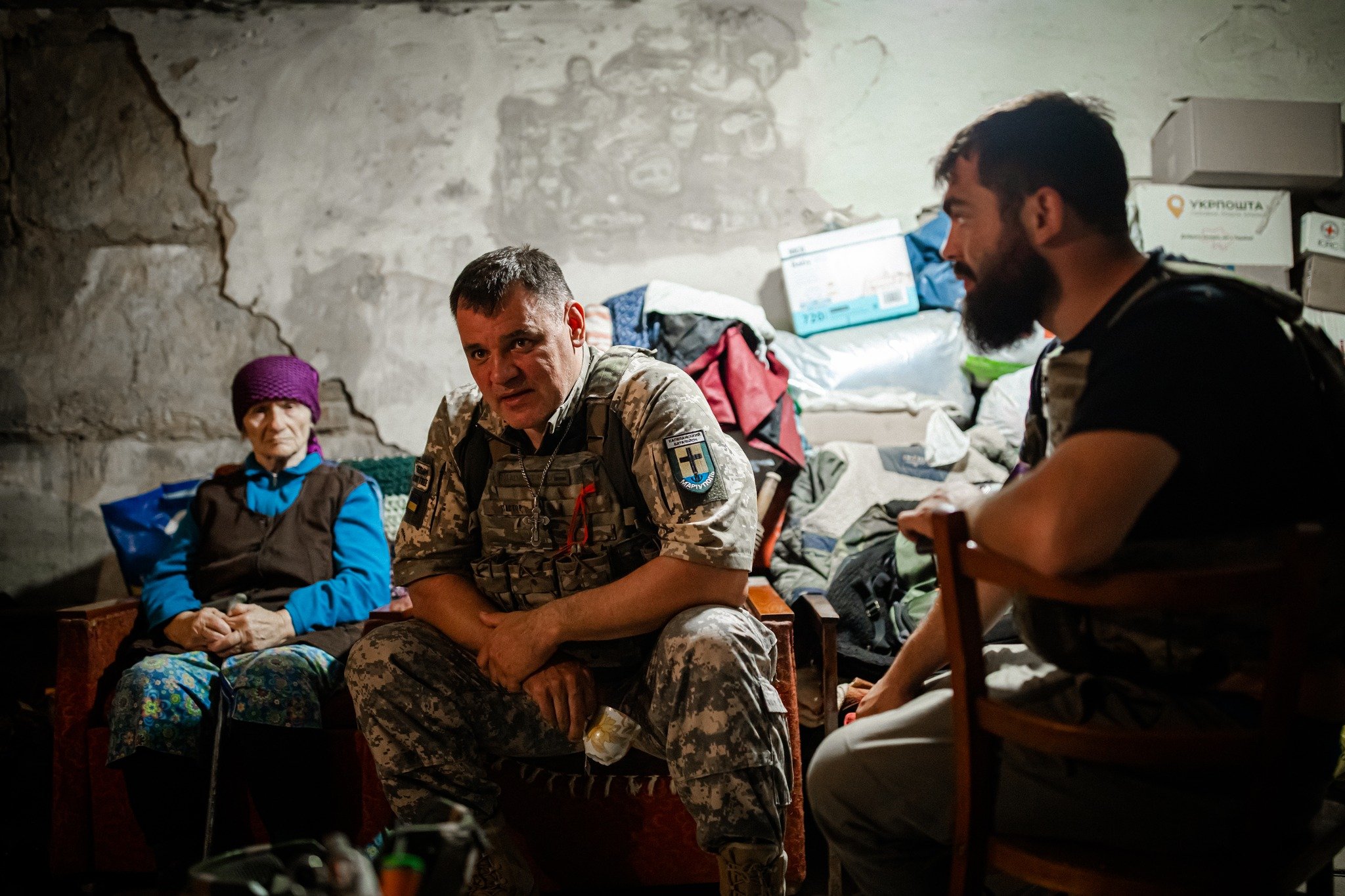"$25,000, cars, and 'respect' for switching to the UOC-MP. How the occupiers are eliminating parishes of the OCU, UGCC, and Protestants
In September this year, in the uncontrolled part of Donetsk region, the last parishes of the OCU (the Orthodox Church of Ukraine). were disbanded, and priests were transported to a Russian prison. Their whereabouts are unknown.
Read this article in Ukrainian
In the temporarily occupied territories, believers of churches that have rejected Russian jurisdiction predominantly gather covertly in apartments. Representatives of the Orthodox, Greek Catholics, and Protestants shared details about the religious situation under occupation with Texty.org.ua.
OCU: Threats, Beatings, Arrests in Donbas
Today, I spoke with an elderly parishioner from one of the churches in the temporarily occupied Donetsk region. He barely managed to reach me through a messaging app. He shared that in the church, recently seized and appropriated by the Moscow Patriarchate, the so-called rector during a sermon forced believers to publicly denounce me and the Orthodox Church of Ukraine.
90% of the people remained silent, remembering that I, along with my philanthropist friends, had built and decorated this church. Most of these believers were baptized and married by me, and I even taught Christian ethics in the local school.
A few, however, refused to comply," wrote Sergey Horobtsov, Metropolitan of Donetsk and Mariupol of the OCU, on his Facebook page in December this year.

In 2014, he left Donetsk for the Telmanivsky (now Boikivsky) district, a region settled by Ukrainians deported during the "Operation Vistula" from Western Ukraine and Poland. At that time, the area had many parishes under the Ukrainian Orthodox Church – Kyiv Patriarchate (UOC-KP).
The region fell under occupation in late September 2014. Friends warned Horobtsov that he was being targeted, prompting his timely escape. Right after his departure, unknown individuals raided the eparchial administration, searching for documents and Ukrainian flags.
In the Donetsk eparchy of the Orthodox Church of Ukraine (OCU), there are 136 registered parishes, with 60% located in the temporarily occupied territories. Currently, all OCU churches are either closed or sealed, and about 30% have been taken over by the Russian Orthodox Church of the Moscow Patriarchate, Metropolitan Serhiy explains.
He shares that in September, two of their priests were arrested. These were the last active parishes in their eparchy. FSB agents had been dispatched earlier to monitor the priests' sermons. Despite the priests avoiding any provocations against the local authorities, they were not risk-takers, he notes.
According to a deacon's account, as recounted by Metropolitan Serhiy, representatives from the "DNR" Ministry of State Security and the FSB appeared before the arrest. The priests were handcuffed and initially taken to a detention center in Donetsk, then transferred to Russia a few days later. They faced trial and imprisonment, with their whereabouts now unknown.
The Russians are accusing priests of illegally conducting sacraments and rites. According to Serhiy, they consider services held in Ukrainian as illegal because any expression of Ukrainian national identity is deemed extremist there.
Metropolitan reveals that his priests have been pressured to join the Russian Orthodox Church of the Moscow Patriarchate (ROC MP).
The priests were initially offered financial incentives, ranging from $25,000 to $30,000, cars, impressive churches, and respect.
Later, threats involved confiscating official documents and barring priests from churches. The intimidation escalated to threats of imprisonment.
Ultimately, the threats escalated to potential imprisonment," stated the bishop. "In 2015-2016, there were instances of priests being assaulted.
One was beaten severely when he was confronted. Fortunately, a group of women passing by intervened after witnessing their priest being attacked. This priest, a diabetic, urgently needed insulin following the assault but didn't have any.
When he sought medical help, the doctors, knowing he was a Ukrainian priest, deliberately withheld his medication. Tragically, he passed away."
In a deceptive operation, the secretary of the Donetsk eparchy was lured away from the church for a supposed car blessing.
He received a call in Ukrainian: "Father, we are calling at the request of the bishop and ask you for a car blessing ceremony."
"These people stipulated that the blessing should be done not on church grounds but elsewhere. Father Andriy agreed. They asked how much it would cost. He replied that our church does not have a fee. He arrived at the location. There was a new car without license plates. A woman and two men came out. They received the blessing, chatting in Ukrainian. Father Andriy blessed the car. Afterward, they gave him money in an envelope, saying, 'Take it, take it, it's charity.' He put it in his pocket. At that moment, one of the men handcuffed him. The priest was taken to the police department and held there for two days.
Then a traitor arrived — a representative of the ""DPR" (the "Donetsk People's Republic") religious affairs, Serhiy Gavrish. He said: 'If you don't switch to the Moscow Patriarchate now, you will deal not with me, but with the Cossacks or the police.' While he was detained, he was vulgarly intimidated and pressured. But he remained unbroken and was released after some time."
Bishop Serhiy notes that since 2014, there has been pressure on parishioners, particularly those who were active in assisting with church repairs and singing in the choir.
The Ministry of State Security of the “DPR” warned parishioners that if they continued to attend the Ukrainian Church, they would face punitive measures.
The Ministry of State Security of the “DPR” warned parishioners that if they continued to attend the Ukrainian Church, they would face punitive measures.
Specifically, they were told that their pensions would be revoked and their children and grandchildren would encounter problems.
Initially, parishioners were monitored and then visited by the "DPR" Ministry of State Security. They were threatened with pension cuts and harm to their families if they attended the Ukrainian Church, while promising benefits for joining the Moscow Patriarchate. Many were intimidated, some believed the threats, and others chose not to attend any church rather than convert. Most parishioners from regions with Ukrainian and Polish resettled citizens were unlikely to convert, preferring private prayer. The majority of priests, with the bishop's blessing, left the area to protect their families and avoid persecution by the FSB.
Crimea
In Crimea, over the last decade, there has been a near-total loss of operational parishes of the Orthodox Church of Ukraine (OCU). The self-proclaimed authorities confiscated their churches. Recently, another priest left Crimea after receiving draft notices from the military, risking conscription into the Russian army.
Throughout the ten years of occupation, the Orthodox Church of Ukraine (OCU) in Crimea has consistently held services in Ukrainian and prayed for the state of Ukraine and its military.
The OCU is the only religious structure in Crimea that did not collaborate with the occupiers and did not register under Russian law, resulting in ongoing oppression and persecution.
A notable incident occurred in May this year when the Cathedral of the Equal-to-the-Apostles Prince Volodymyr and Princess Olha in Simferopol was seized. Andriy Shchekun, Chief Editor of "Crimean Room," notes that despite pressure and attempts at recruitment, no OCU priest defected to the enemy, the UOC MP, or the ROC.
Most of them left occupied Crimea due to safety concerns for themselves and their families. Shchekun did not specify how many OCU priests remain in Crimea or how parishioners are gathering for prayers to avoid drawing attention from the occupying authorities.
UGCC: Deportation with a Bag Over the Head
Previously in the Melitopol region of Zaporizhzhia Oblast, there were three priests of the Ukrainian Greek Catholic Church (UGCC). On November 25 last year, 67-year-old Father Petro Krenitsky was the first to be deported from Melitopol. Before his deportation, unknown assailants entered his yard, assaulted him, and then blindfolded him before taking him away in a car. Krenitsky was taken to a remote checkpoint where he was declared deported for his church's non-support of Moscow's policies. He walked several kilometers before being picked up and taken to the first Ukrainian checkpoint in Kamyanske.

A week later, two other UGCC priests, Alexander and Leonid, also had to flee occupied Melitopol.
Father Alexander Bogomaz had been repeatedly interrogated by special services before his eventual deportation. The Church of the Nativity of the Theotokos, where he served, was vandalized, and their community bus was taken. Despite these challenges, parishioners continued to meet for daily prayers at the Saint Anna Church in the New Melitopol area, conducting services themselves and consulting with Father Petro online when possible.
On the feast of the Descent of the Holy Spirit, about 40 people gathered at the church, where armed soldiers announced an official ban on their church in Zaporizhzhia Oblast for not supporting Moscow's policies.
The soldiers behaved rudely and checked passports, causing an elderly woman to faint, which somewhat calmed the situation.
The parishioners started meeting in homes, and on Sundays, they traveled to Kherson Oblast, where their church was not officially banned. The decision to ban the church depended not only on local authorities but also on the attitude of local Orthodox priests toward the UGCC.
Despite assurances from a local Orthodox dean in Melitopol that they would be safe, the situation turned out differently.
Protestants: 'They were beaten with examples and taken away to be shot.'
In November last year, UGCC priests Ivan Levytsky and Bohdan Heleta were arrested in Berdyansk after conducting peaceful city-center protests praying for peace.
Local authorities report they are being tortured in Berdyansk's 77th colony. Protestant communities in Donetsk, who refused to come under Russianjurisdiction, are now meeting secretly for prayers. Bishop Yevhen Lyashenko from Horlivka found himself under occupation in 2014 and later evacuated, helping two thousand people across the front line. Initially, the Russians did not interfere with their activities but later began arresting those who did not agree to re-register under Russian flags.
Initially, the Russians didn't interfere with our activities, stating that once hostilities ended, there would only be one Orthodox Church under the Moscow Patriarchate. Later, they began arresting those who disagreed. As a result, some believers left the area. All churches in Donetsk had their registrations revoked and were told to re-register under the Russian flag. Those who refused were forced to transfer property rights.
Then they started arresting us, and as a result, some believers left
Priests who spoke out against the war and condemned Putin's regime were targeted by special forces for arrest. Some managed to escape at the last moment, while others now face trial. The remaining community feels hopeless and resigned to their situation. Yevhen Lyashenko shares these experiences.
Mariupol's well-known Pentecostal pastor and military chaplain, Gennadiy Mokhnenko, observes that churches opposing Putin and calling the occupation for what it is have no chance of survival. Their buildings are confiscated, and gatherings are banned, leading to underground Christian meetings and prayers for Ukraine's return.
In 2014, a pastor was forbidden from holding services, sharing Gennadiy Mokhnenko. Defying this ban led to a brutal encounter with armed men who beat him and intended to execute him. En route to the pastor`s execution, a decision was made to consult a Moscow-affiliated clergyman, who gave the pastor 24 hours to leave, citing his large family.
This incident illustrates the dire situation for churches that refuse Russian jurisdiction, as they are reduced to mere ritual service bureaus without true faith or ethical judgment. Most Protestant churches in Mariupol ceased their services.
Gennadiy Mokhnenko, a pastor and active volunteer since 2014, narrates this account while aiding military personnel in Avdiivka.

Previously featured on Russia Today as a "hero of our time," Mokhnenko is known for founding "Republic Pilgrim," the largest children's rehabilitation center in the former Soviet Union, and a network of centers for adults.
He has 3 biological and 32 adopted children. In 2022, his adopted daughter was killed by the occupiers.
Russian propaganda now often misrepresents his "Church of Good Changes."
This spring, the Russian representative at the UN, Vasily Nebenzya, claimed in the Security Council that a children's camp in Mariupol was training terrorists from the age of seven. The pastor adds that this camp is his center.
In another incident in Mariupol, a woman's phone was checked and, upon finding the pastor's contact, she was arrested and taken away, her whereabouts unknown.
The "Church of Good Changes" is now occupied by Russians, with the pastor's private house used by the occupiers, the children's camps turned into barracks, and the rehabilitation center converted into an office.

